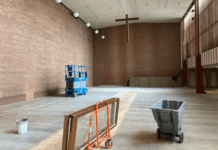“The economy is very bad especially to us rural folks. We cannot afford to buy the basic needs, hence we are very grateful to Hanwa for allowing us to access water.”
The Rev. Solomon Mugadza, pastor-in-charge at Dindi United Methodist Church, said that the solar-powered borehole has been very helpful to the mission’s clinic.
“The borehole has helped the patients at the clinic and staff members, especially during the summer season when the water table had depleted. However, the quantity is not enough to supply to the schools and the communities,” he said.
In October, the Nyadire Connection took action when the Home of Hope orphanage at Nyadire Mission lost its water supply. The all-volunteer group founded by individuals from a network of United Methodist churches in Pittsburgh has been working with the mission since 2006 on water development, said Drew Harvey, Nyadire Connection chairperson.
The nearby Nyadire River had been very low, depleting the mission’s underground water supply.
“Because of the continuing drought situation, the borehole that supplies water to the Home of Hope orphanage had gone dry. (The Nyadire Connection) supported quickly drilling a second borehole which went to 92 meters, but water production was still limited — only enough for the house without much for irrigation,” Harvey said.
He said the new borehole began operating Oct. 30 at a cost of $7,000.
The Rev. Lancelot Mukundu, mission station chairperson, said the whole mission relies on the borehole when electricity is out, not just the Home of Hope orphanage.
Emmanuel Chiimba, administrator for the orphanage, said the home has 18 children and 10 staff, along with their families, who directly benefit.
“Before the new borehole, most boreholes had low capacity and could not meet the demand for both domestic and crop irrigation water,” Chiimba said.
The home has more than 50 hectares and runs different agricultural projects — livestock, crop and horticulture production— to enhance food security.
“From the harvests, we supply the kitchen and sell the surplus,” Chiimba said. “Currently, we have a variety of vegetables, watermelons and green mealies (corn) ready for consumption due to the borehole water. Generally, green mealies and watermelons are off-season, but we have them because we irrigated using water from the borehole.”
The Norway-Zimbabwe Community Development Program, through its Chabadza initiative, also supported the church’s water efforts this year, drilling a $4,000 borehole in Matsviru Village in Hurungwe, about 250 kilometers from Harare.
The Rev. Musafare Mususa, director for Chabadza program said, the village head applied for assistance in 2017.
Harare West District superintendent the Rev. Phillip Musharu said during the dry season, the community travels long distances in search of water for themselves and their livestock.
“The area is very dry and some of it is mountainous. During the rainy season is the only time they can access water close by but from unprotected sources,” he said.
“That outreach by the church is very important because we reached out to the needy people not for them to come to church but for them to have the basic rights.”
This article originally appeared on UMNews.org. You can subscribe to UM News’ daily or weekly newsletters here.











